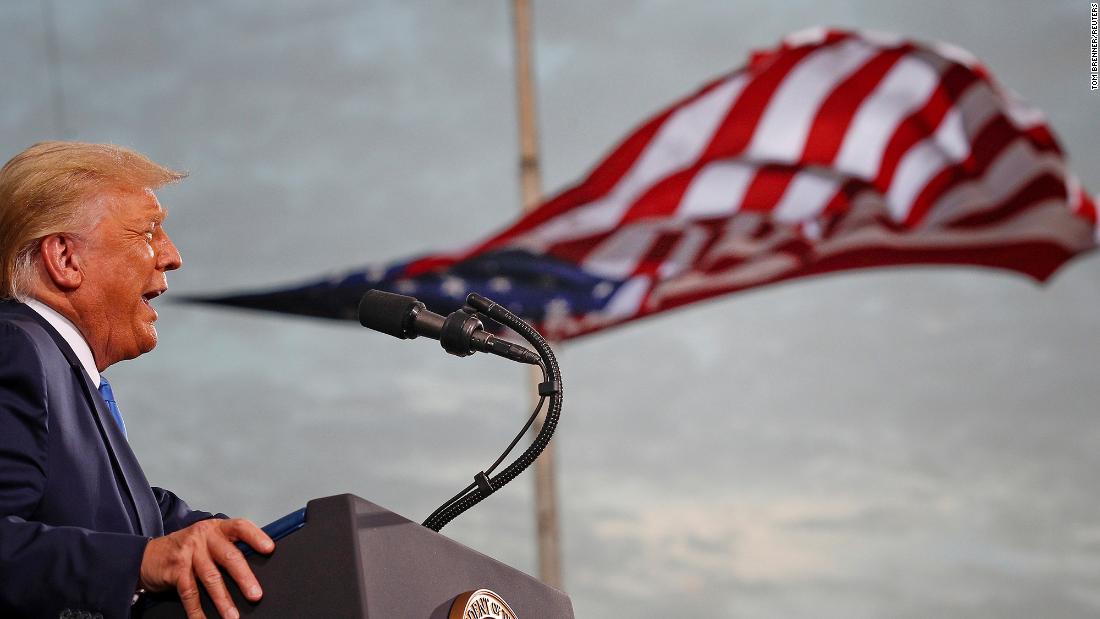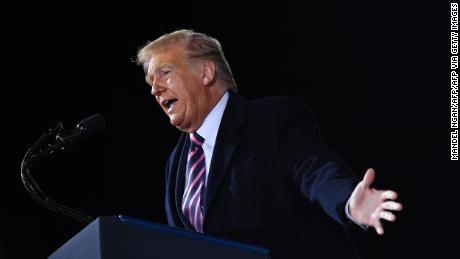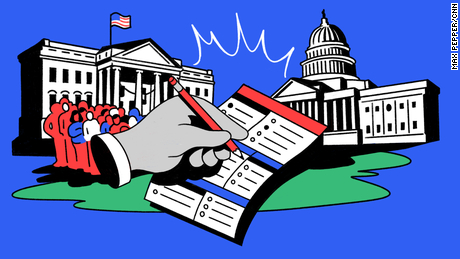Analysis: White House stakes out a dangerous position
As the implications of Trump’s statement about the transition of power begin to sink in, Trump, as he so often does, barged ahead, seeking to drive home his case that the vote may be rigged.
But Trump’s attitude is causing real harm now, even as Americans in some states cast early and mail-in votes. It is not only raising the prospect of a divisive post-election period in November — it is making it more likely that Trump’s supporters will view the election as invalid and will refuse to accept the result if he doesn’t win. An election in which the loser declines to concede could breed tensions, years of recriminations and ultimately gravely weaken America’s long-enduring democracy.
Far from working to honor the public trust it holds as the defender of America’s core political values, the White House Thursday staked out a dangerous position, built on the foundation of Trump’s false claims that mail-in voting is corrupt, which could form the political basis of a post-election challenge.
“The President will accept the results of a free and fair election,” White House press secretary Kayleigh McEnany said.
Meadows said of Wray on “CBS This Morning”: “Perhaps he needs to get involved on the ground and he would change his testimony on Capitol Hill.”
‘The President says crazy stuff’
“The President says crazy stuff. We’ve always had a peaceful transition of power. It’s not going to change,” said Sen. Ben Sasse of Nebraska.
South Dakota Sen. John Thune, the No. 2 Senate Republican, said he was confident Republicans would ensure such a peaceful transition if necessary.
“Republicans believe in the rule of law, we believe in the Constitution, and that’s what dictates what happens (in) … our election process and so yes.”
Trump is challenging democracy on multiple fronts
One weakness of the White House approach is that in order for it to fuel credible legal challenges, there will need to be genuine evidence of fraud in mail-in voting. Therefore, Trump’s lawyers will likely seize upon even the smallest example of irregularities to bolster his case that an election in which he has trailed Biden in the polls for months, is fundamentally corrupt.
On Thursday, for instance, the Justice Department said it was investigating alleged problems with mail-in voting in Pennsylvania. In a highly unusual move, it said nine military ballots were found and that seven “were cast for presidential candidate Donald Trump.” The statement immediately sparked suspicions that the department was seeking to highlight evidence of an isolated incident to provide political ammunition for the President.
Indeed, Trump seized on the incident, saying the ballots were found in a wastepaper basket.
“They throw them out if they have the name ‘Trump’ on it, I guess,” Trump said.
In the 2016 election, Pennsylvania cast 6 million votes, meaning that the nine ballots concerned here make up a tiny proportion of the total vote on which to base a case that the election is unfair. The US attorney said in a letter to county election officials that it appeared confusion was the cause of the prematurely opened ballots — the envelopes appeared similar to the ballot application envelopes — and did not allege any political motivation.
Speaking generally, Benjamin Ginsberg, a veteran Republican election lawyer, said on CNN’s “Cuomo Prime Time” that there was no significant evidence of mass voter fraud in US elections.
“There is a body of evidence, but it’s a really small body of evidence that has been collected on fraudulent ballots over the years. And it is far too thin, just isolated cases of fraud, to make the allegation, the assertion that our elections are fraudulent or rigged.”
‘Questioning the legitimacy’ of the election
Trump’s strategy is multi-pronged. Besides helping him build a case that the election was rigged should he lose, his attacks on mail-in voting may also be an attempt to suppress voting by convincing people that the mail-in option is not secure.
“It’s clearly making people concerned about voting by mail, first of all the issue of ‘will it be counted,'” Trevor Potter, the former chairman of the Federal Election Commission, told CNN Thursday.
“(It’s) questioning the legitimacy … that’s really a PR gambit because legally a vote cast on an absentee ballot by mail is just as legitimate as one cast in person and both have the same security safeguards,” the Republican lawyer said.
The job of securing the vote, and of responding to an expected burst of legal challenges by the Trump campaign, will fall to secretaries of state who will be under fierce pressure in closely fought swing states.
Michigan’s Democratic Secretary of State Jocelyn Benson said that results in the critical battleground may not be available until the Friday after Election Day, which is on Tuesday, November 3.
“This is the way democracy works: no winner is declared until every ballot is counted,” Benson told CNN’s Brianna Keilar.
“At the same time, we recognize that from the minute the polls close to the minute we do have that final tabulation, there will be efforts to try to sow seeds of doubt among our electorate and others about the sanctity of our vote,” she said.
“So we are going to respond to that as we always do with facts, data, truth and transparency.”
![]()








